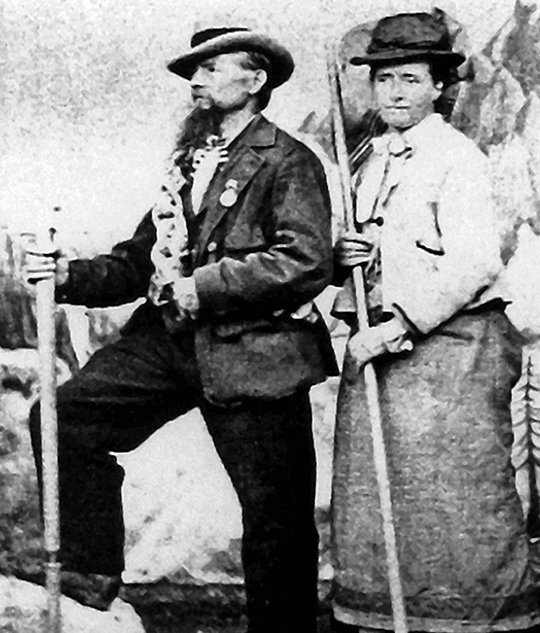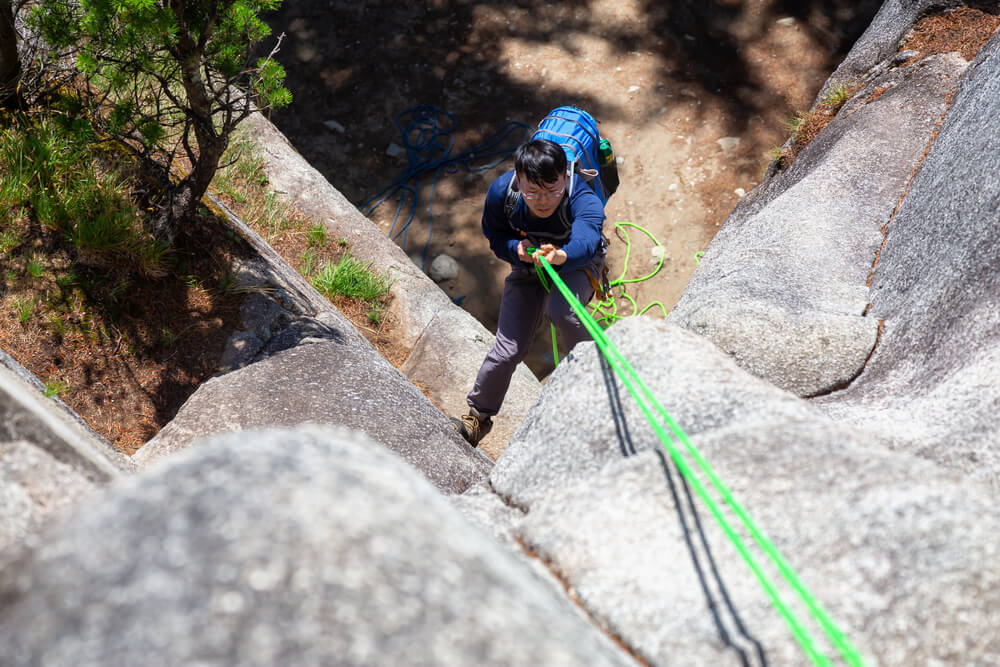I can guess you are probably tired of the many climbing terms – they are indeed a lot.
I have come across several people using rappelling and abseiling interchangeably.
And like you, I was always curious to know if these two words meant the same thing – and that took me to my research.
According to my research and time climbing some mountains, I understood the actual difference between both words.
But, before I share these differences with you, you need to know more about the origin of both words, as it is the main factor differentiating these terms.
Abseiling Origin and History
To abseil (or abseiling) is a combination of two German words; “ab” and “sell.”
The precise origin of abseiling gets attributed to Jean Estéril Charlet, who lived from 1840 – 1925 as a Chamonix guide.

Jean devised this climbing technique during an unsuccessful solo attempt in 1876 at Petit Dru.
In the early 20th century, the word “abseil” came from “ab,” meaning down, and “seil,” referring to rope.
Thus, the coined term refers to the controlled descent from a vertical drop by a fixed rope – not necessarily a mountain.
Rappelling Origin and History
The term “rappel” refers to a return to what once was or a recall act.
The word “rappeller” gets applied more in out of rock climbing than inwards in old French.
The act of rappelling is a mountaineering term used to describe the descent off a vertical wall or cliff using double ropes.
The double used ropes get fixed to a high point while the other side wraps around the mountaineer’s body.
In 1931, the term became more popular as the controlled descent rock climbing activity that made mountaineers alive.
What Is The Difference Between Abseiling and Rappelling
I know you might probably be confident that there’s no difference between both words.
However, there are slight differences, but I wouldn’t count them as anything.
Nevertheless, following my experience and research, I’ll guide you towards some differences I have discovered.
- Geographical Differences
As I earlier stated in their origin/history, both words take roots from different earth locations.
Undoubtedly, I firmly say this; the real difference is mainly in their origin story.
However, in terms of geographical differences, Canada and the U.S., rappelling gets used more to describe climbers.
However, if you move over to Europe/U.K., Germany precisely, you would find out that abseiling is the recognizable term used to describe climbers lowering themselves.
Also, when I was in New Zealand and Australia, the people in these locations used the words almost interchangeably.
I advise you not to get yourself stressed and worked over regarding which word to use.
What’s important is that you understand that the terms refer to the same thing, and you know what you are doing.
I guess no one will care what you call it unless you are in Germany.
- Heritage
Still, on the origin of both words – they have a similar European heritage. However, “abseil” comes from Germany, and it refers to lowering oneself on a rope.
I believe this was the primary term used to describe the experience during the early mountaineering trips.
To “rappel” comes from the same European descent; however, it is more specific to the French heritage.
According to dictionary definitions, both words don’t mean the same thing, but they talk about similar experiences.
Google translates the word “rappel” to mean an act of withdrawing or recalling.
From my encounter with some French climbers, they prefer to see this experience as the process of “withdrawing” themselves from a mountain/cliff.
Why Do People Use Two Different Terms Globally
As I have stated before, locations are the reason behind this significant divide.
Some parts of the word fancy one term over another because of its origin story and linguistic heritage.
Firstly, the Germans think of abseiling as the more appropriate term to use when describing the experience.
However, they are not wrong because they are speaking based on their heritage and culture.
Nevertheless, rappelling is French, and I feel most people tend to connect more with words from French-speaking countries than Germany.
So the reason there’s no one primary term to describe the experience is because of language diversity.
So far, somewhere across the ocean, this same climbing experience might have a different name tag attached to it.
And the “attachers” wouldn’t be wrong to call it what they believe because it will be a popular term amongst themselves.
History of Rock Climbing and Mountaineering
According to my research, climbing as a sport started in the last quarter of the 19th century.
During this time, its occurrence was famous in England, the Dolomites in Italy, and Elbe Sandstone Mountains near Dresden in Saxony.
Furthermore, rock climbing and mountaineering heralded in the 1880s as a sport in England after the first solo ascent of the Napes Needle.
The experience further got inspiration through the efforts of Oskar Schuster in the late 19th century.
Is Abseiling More Popular Than Rappelling?
I find this topic on rock climbing terminologies interesting because of the debate between German and French climbers.

Based on my research, here are some reasons I believe rappelling is more popular than abseiling.
- Location
In the U.K./Europe, abseiling is the more general term used.
However, moving away from that part of the world, you get to hear another word.
Once you more to other places different from Europe, you fadedly hear the term abseiling as a climbing technique.
- Book Wise
Generally, any other part of the word preferably refers to it as rappelling.
Statistically, rappelling gets used about 65% more by English writers than abseiling in books and novels.
- Origin Reference
If you want to judge it by origin, I unarguably hand it over to abseiling.
Anyone looking to talk history about climbing techniques will refer to abseiling rather than rappelling.
Nevertheless, in terms of popularity, I’d instead give it to “rappelling.”
However, many climbers are familiar with abseiling; it’s just that rappelling has the upper hand during communications outside Europe.
Why Should You Care What It’s Called
Personally, I bother about what both terms mean and their origin story mainly due to the culture.
However, I’d advise you to care about what it’s called because it helps ease any brooding tension amongst climbers.
For instance, if you are in Germany or the U.K., call it abseiling; that way, everyone there knows what you mean.
The same thing goes for rappelling when you are in a French-speaking country, the U.S., or Canada.
Conclusion
I believe you have understood what both terms, abseiling and rappelling, refer to – similar activity, but different backgrounds.
Moreover, you can use both words interchangeably, mainly depending on your location.
This way, everyone around you knows what you are referring to.


